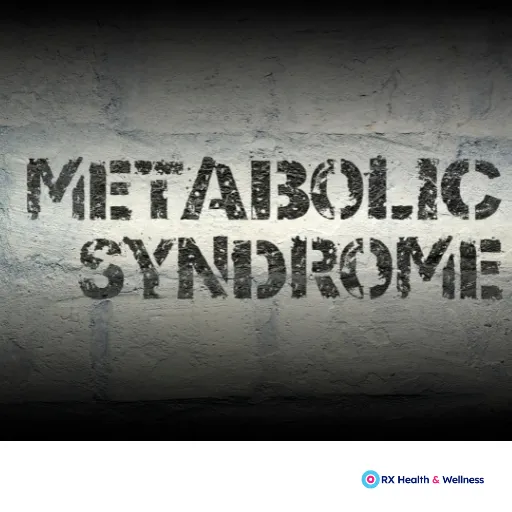
What Is Metabolic or Cardiometabolic Syndrome?
What Is Metabolic or Cardiometabolic Syndrome?
Cardiometabolic Syndrome (CMS) is a cluster of health problems. These include insulin resistance, high blood sugar, high blood pressure, belly fat, and abnormal cholesterol levels.
Both the World Health Organization and the American Association of Clinical Endocrinology recognize CMS as a real and serious condition. It's linked to a much higher risk of heart disease, stroke, and diabetes.
What Does CMS Include?
CMS combines two major issues:
Metabolic Syndrome – This refers to belly fat, high triglycerides, low HDL cholesterol (the “good” kind), high blood pressure, and abnormal blood sugar levels.
Cardiovascular Disease – This includes heart attacks, strokes, heart failure, irregular heartbeats, and clogged arteries.
CMS is also connected to chronic conditions like:
How Is CMS Diagnosed?
According to the NCEP ATP III guidelines, CMS is diagnosed if you have three or more of the following:
Waist size over 35 inches (women) or 40 inches (men)
Blood pressure higher than 130/85 mmHg, or taking medication for it
Fasting blood sugar over 100 mg/dL
Triglycerides over 150 mg/dL
HDL cholesterol under 50 mg/dL (women) or 40 mg/dL (men)
Who’s at Risk?
If you're overweight, smoke, or have high blood pressure or blood sugar, your risk is higher.
If you reach age 50 without any risk factors, your lifetime risk of heart disease is low—about 5% for men and 8% for women.
But if you have two or more risk factors at age 50:
Men are 14 times more likely to die from a heart attack or stroke.
Women are 8 times more likely.
Even one risk factor increases risk:
Men with one factor are 10 times more likely to die from heart disease.
Women are 5 times more likely.
People with diabetes at age 50 have the highest risk.
Smoking doubles the risk and raises the risk of cancer too.
How Does CMS Affect the Body?
CMS often starts with too much belly fat. Belly fat causes more inflammation and increases the risk of blood clots. It’s a stronger risk factor than total body weight (BMI).
Fat around your waist and liver leads to insulin resistance. This means your body stops using insulin effectively. Over time, blood sugar and insulin levels rise.
Studies also show damage to your mitochondria (your cells’ energy centers). This damage reduces fat burning and increases fat storage.
In insulin resistance, your body produces more insulin. Too much insulin:
Raises blood pressure
Increases fat storage
Keeps blood sugar high
Conditions Linked to CMS
CMS and insulin resistance are connected to many chronic diseases. These include:
Fatty liver
Heart disease
Type 2 diabetes
Obesity
Sleep apnea
PCOS
Some cancers
(Source: Institute for Functional Medicine)
What Makes Treatment Hard?
Standard medicine often focuses on controlling each symptom:
Lowering blood sugar
Reducing cholesterol
Controlling blood pressure
But this approach doesn’t fix the root cause: insulin resistance and inflammation.
In functional medicine, we look deeper. We ask: Why is insulin high? Why is inflammation present? The real goal is to lower insulin resistance, reduce inflammation, and support long-term healing.
What Helps?
1. Exercise and Movement
Exercise is a powerful tool. Just 30 minutes of brisk walking daily can reduce CMS risk. Movement lowers blood pressure, improves insulin sensitivity, and boosts energy.
Exercise also reduces inflammation and stress—two key triggers of chronic disease.
2. Nutrition
Food is medicine. A diet rich in:
Whole foods
Plants
Lean protein
Healthy fats
...can reverse many signs of CMS.
Avoid:
Ultra-processed foods
Sugary drinks
Refined carbs
Aim for anti-inflammatory, fiber-rich meals to support weight loss and blood sugar control.
3. Weight Loss
Weight loss—especially around the belly—can reduce CMS dramatically.
Conventional medicine may recommend weight-loss surgery. But surgery has risks and may lead to nutrient deficiencies.
In functional medicine, we prefer lifestyle changes:
An anti-inflammatory diet
Stress reduction
Daily movement
These work together to promote lasting weight loss.
Financial and Personal Cost of CMS
CMS isn’t just a health problem—it’s an economic one.
A person with one CMS condition spends about $5,564/year on healthcare.
A person with four CMS conditions spends $12,287/year.
People with CMS miss more work and are 40–45% less likely to be employed.
In 2014, the U.S. spent $80 billion on cardiometabolic risk factors—$27 billion on prescriptions alone.
We are spending more, yet getting sicker. Most people over 60 take 4–5 medications. Many under 60 still need at least one.
Functional Medicine Offers a Better Way
Despite high healthcare spending, chronic disease is rising. We aren’t just dealing with numbers—we’re dealing with real lives.
Functional medicine offers a new approach. It treats the whole person, not just the symptoms. By targeting root causes—like inflammation and insulin resistance—you can heal from within.
You don’t have to settle for managing disease. You can reverse it.
Want to Take Action?
Explore the Cardiometabolic Makeover. It’s designed to help you reset your metabolism, reduce insulin resistance, and reclaim your health—naturally.
References:
National Cholesterol Education Program (NCEP) ATP III Guidelines. NHLBI, 2005
American Association of Clinical Endocrinologists (AACE) Position Statement on CMS, 2021.
Grundy SM, et al. "Definition of Metabolic Syndrome." Circulation. 2005.
CDC. "Cardiometabolic Risk: Health and Cost Burdens."
Institute for Functional Medicine. www.ifm.org
